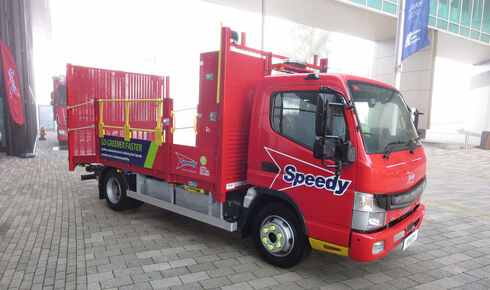
Speedy urges united action on emissions goals
4 December 2023

Speedy Hire last week held an online conference with dedicated sessions for suppliers and customers conveying the overall message that all parties must work together to achieve common Net Zero goals.
Called Speedy Live Net Zero 2023 and hosted by TV personality Sam Quek, a former England and Great Britain hockey player who played in the 2016 Summer Olympics, the event focused on the nature of the challenges and the steps required to meet them.
Amelia Woodley, Speedy’s ESG Director - whose recent interview on the blog can be seen here - said that the company wanted to bring about a ‘hire revolution’, making hire the first choice for procuring equipment as part of a circular economy, ensuring the most efficient use of tools and plant and the materials used in making them.
Amelia said that many of Speedy’s contracts now include a customer requirement for the hirer to help them meet their Net Zero obligations and that more stakeholders in future would expect others in the supply chain to have strong ESG values and policies in place.
Speedy’s own sustainability strategy, called Decade to Deliver, states that actions taken in the next 10 years will dictate the next 100 in terms of climate action. The company has adopted Science Based Target initiatives (SBTi) to achieve Net Zero throughout its entire operation by 2040, ten years ahead of the UK government’s official target.
The hirer, incidentally, has also just been awarded Gold status by the EcoVadis consultancy which scores organisations on their efforts to reduce carbon emissions and benchmarks performance across environment, labour, ethics, human rights, corruption and sustainability. Speedy says this means it is now in the top 5% of businesses in its sector for sustainability.
In the EcoVadis assessment, the company received an overall score of 76/100, including an impressive 90/100 on policies towards the environment and carbon emissions.
Publicly quoted companies like Speedy are obliged to set and meet emissions targets throughout their supply chain and so they need relevant data from other stakeholders for the necessary calculations.
Some companies already have the information to hand but others may be reluctant, citing time and cost concerns. However, Speedy (and other businesses) is asking them to monitor and control their Scope 1, 2 and 3 emissions. And who knows what future plans governments may have to make such actions compulsory for other organisations? So acting proactively will benefit a business as well as the planet, says the hirer.
The blog has highlighted earlier measures that Speedy is taking to reduce its carbon footprint. At the conference, Amelia Woodley said that by 2027, 70% of its fleet will comprise ‘eco’ alternatives, for example. She said Speedy was moving from a ‘linear’ business model to a circular one, in which tools are no longer purchased just to eventually be thrown away: a circular model (as promoted by manufacturers like Hilti, as reported previously) would see tools designed to be reused, repurposed and recycled for optimal use of resources.
Speedy says it has developed a number of strategies which can help its suppliers take the necessary positive steps, including software to help assess Scope 3 emissions – the biggest source of emissions for virtually all organisations.
Another conference speaker, Matthew Pygott who is a carbon consultant with the Hydrock agency which is working with Speedy, said that adopting sustainability strategies could help companies win future business. Many tenders for products and contracts now stipulate a need for sustainability data to be provided, and all government public procurement tenders for projects worth over £5m must now include a carbon reduction plan, for example.
Adopting an attitude of data transparency and positivity, he said, would enable inefficiencies and overspending in certain areas to be identified. And embracing Net Zero would upskill and future-proof people within a business, as well as encouraging new environmentally aware talent to join.
Above all, said Matthew Pygott, Net Zero is a journey and not something that can be achieved overnight or next year. It requires a planned, strategic approach.
Andy Connor, Speedy’s Supply Chain and Innovation Director, spoke about ways of decarbonising hire. He said the industry had faced challenges before such as meeting regulations concerning work at height and hand-arm vibration (and helping customers to address them), but sustainability was something even bigger. “The blueprints for working are having to be ripped up and we’re starting again,” he said.
Speedy had assessed its own fleet in 2021 and found that 25% was already ‘eco’ in nature. The aim is to increase that incrementally by 10% annually.
Andy said the company is adding solar, battery and hydrogen powered equipment, as well as clean-diesel Stage V compliant products which could also run on HVO. He also mentioned briefly work being done to produce synthetic alternatives to fossil fuels.
He said that many such products also gave benefits in areas such as Health & Safety. Cordless equipment, for example, removed trip hazards associated with cables, and items like battery powered cut-off saws do not require regular servicing. So embracing ESG could deliver operational improvements and related cost savings.
Similarly, Andy recognised that products incorporating new technology could be two or three times more expensive than traditional counterparts. However, software and telematics deployed on machines could not only quantify the carbon reductions and cost savings, but also highlighted inefficiencies such as heaters being kept running when unnecessary.
Such information could also show exactly how long a tool or piece of equipment has actually been used, and so the life of an under-used item in a hire fleet could be extended before replacement, reducing overall costs.
Highlighting the need for co-operation throughout the supply chain, Andy cited the example of Speedy working with Niftylift to develop a hydrogen fuelled access platform, and it has partnered with another supplier to create a plastic recyclable fence panel.
“We can’t compete to save the planet,” he said. “We all have to work together.”
Photo: Alan Guthrie

